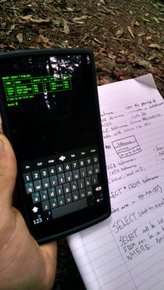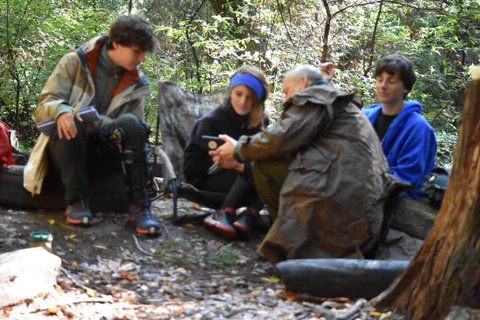FAQ -- Do You Let Your Students Have Technology, Why?


“You never change things by fighting the existing reality. To change something, build a new model that makes the existing model obsolete” (Buckminster Fuller)
FAQ: Do You Let Your Students Have Technology, Why?
Answer: Yes We Do, as a Tool But Not for Entertainment
This tool of research students have today is mind-blowing.
Let’s revisit this topic. You may have noticed that every page has a pair or more quotes on the bottom germane to the content, interestingly as I was looking for quotes on this topic in this age of school focused on technology in the classroom doing Google, Bing, and Yahoo the negative quotes significantly outnumbered the positive ones. What an interesting observation. We see it as an outstanding tool that children must learn to respect both for its value and its dangers.
As a grad student, I would wake at night with a burning question, make a note, lay awake chewing on it. Before the sun was washing out the morning stars I would make the 40-mile drive to the university, when I would have a long enough break between classes and work I would dig through the bound indexes looking for the right keywords, then hope the microfiche, I believe held the possible answer to my question, got put back in the right place by the last grad student. The sheets of film, now in my hand, now to find an open reader, and painfully scan these photos of documents for my key phrase. If it addressed my question positive or negative it was time well spent. It was likely sixteen hours from the time my question woke me and my possible answer if at all. If my question hit me on Thursday night it would be Tuesday before I would come out of the mountains to be on one of two campuses.
Now I simply roll over, do a dozen keystrokes and I’m in the Yale Law Library on the other end of the continent, looking at documents from 1787. A dozen more keystrokes and there highlighted is my key phrase. Wow. the stars are still in the sky and I have what James Madison wrote, answering my question about his intent. Wow. No, I am not a Luddite. Shoot, back in university it would be Friday before I was at the pub to share what I found with my friends, now, I haven’t had my morning coffee or shower and here I am sharing my thoughts with you. No, I’m not a Luddite, and you bet our students learn to use these tools throughout the day.
We use the Smart Phone as Many Tools
When we start a discussion on reading and nature we will ask one or more students to boot up their phone(s) in airplane mode. When the need arises the student will be ready to look up a word in the English Oxford Dictionary that we question or play the bird call from the [Cornell University Ornithology library(https://www.allaboutbirds.org/guide)or iNaturalist to see if anyone else has seen this species in our area. During our discussions, I might have a student bring up Federalist Paper #10 to clarify a point from the Yale Law Library. At home, I may have them print out a passage from a historic document to review and bring to class the next day. I may have a student review a math lesson in Kahn Acadamy the night before we work on some new topics. During the discussion, I may have a student e-mail me some questions to look up or prepare for the next day. One day a week the students will use their phones to assist them in fleshing out their nature journal with taxonomy and answer questions about the range, behavior they cannot answer from observation and discussion alone. We also call and email questions to off-site mentors as well as having our offsite students join in on our discussions.
When we’re working on assignments all use their phone to help complete work, those that don’t have a phone or are too young to be allowed to have one may use mine. The smartphone eliminates weight from our students’ packs replacing field guides, dictionary, calculator, spell checker, and camera. Documenting their work with photos and videos is just as important as their handwritten work, it does not replace the written work but supplements it. These tools allow them to publish their work in our e-newsmagazine, on our Facebook Pages, and in their online portfolio to help them earn employment or enrollment. We have used our smartphones as a hot spot for our laptops to edit our website right from the forest.
What We don’t Use it For
What you will not see is a student with earbuds in listening to music or any other entertainment or checking their social media feeds these activities are not allowed. Our students would rather spend their time reading from a book, doing rough and tumble play, having free exploration, telling jokes or stories, building RC buggies, shooting archery or trap, rappelling off a cliff, or playing music on their instruments. We develop the habits in the students of living life, having fun, doing real things, they don’t get into the habit or worse the addiction using technology for the endorphin hits. We also educate the students on the true dangers of some sites and content.
Developing Skills in Using the Tools and Understanding their Limitations
The key is we want to have students raise their bar using the technology. We want them to have the skills to use their technology efficiently and skillfully. It is not enough to go do a Google search or look something up in Wikipedia any more than it was for the babyboomers to do all their research in the Britannica. We want the students to understand just because you cannot find something using search engines does not mean it did happen or a notable person did not say it any more than just because you can find something on the internet it must be true.
Developing Internal Discipline
We expect the students to have the ethics to be self-governed and we believe that developing discipline through guided trust is much better by simply removing the temptation. Through the demonstration of self-discipline, they demonstrate maturity, they earn trust and therefore earn responsibility, it is a real right of passage. This is how they earn the right to carry a knife, their phone, a firearm. We do not take rights away from our students because some bureaucrats make policy. There are times it is appropriate for any of these items to be out and used, there are times that it is not appropriate for them to be out. Being self-governed is important for the success of our Constitutional Republic, the framers of the Northwest Ordinance and the US Constitution understood. It is our goal through our actions to protect the US Constitution and this can only happen by developing in our students their moral compass that only comes with developing internal discipline.
In Summary
We are not Luddites or despotic about technology but we develop in the students limits of use and usefulness.
“Technology should Be Your Servant, Not Your Master.” ― Ludovic Tendron, The Master Key
